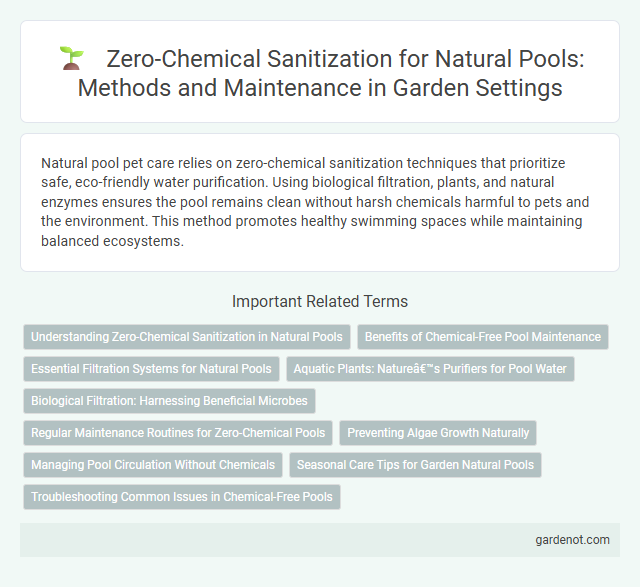Natural pool pet care relies on zero-chemical sanitization techniques that prioritize safe, eco-friendly water purification. Using biological filtration, plants, and natural enzymes ensures the pool remains clean without harsh chemicals harmful to pets and the environment. This method promotes healthy swimming spaces while maintaining balanced ecosystems.
Understanding Zero-Chemical Sanitization in Natural Pools
Zero-chemical sanitization in natural pools relies on biological filtration systems that use plants, beneficial bacteria, and natural substrates to maintain water clarity and hygiene without synthetic chemicals. This eco-friendly method promotes a balanced aquatic ecosystem where microorganisms break down contaminants and organic matter, reducing the need for chlorine or other chemical disinfectants. Understanding this process highlights the importance of designing natural pools with carefully selected vegetation and substrate layers to optimize water purification and ensure safe, chemical-free swimming conditions.
Benefits of Chemical-Free Pool Maintenance
Zero-chemical sanitization in natural pools enhances water quality by maintaining ecological balance through biological filtration and aquatic plants, eliminating harmful chemical residues. Chemical-free pool maintenance reduces skin and eye irritation, promoting a healthier swimming environment while minimizing environmental impact. This approach also lowers long-term costs associated with purchasing and handling traditional pool chemicals, ensuring sustainable and eco-friendly pool care.
Essential Filtration Systems for Natural Pools
Essential filtration systems for natural pools rely on biological filtration using plants, beneficial bacteria, and biofilters to maintain water clarity and safety without chemicals. These systems mimic natural ecosystems by breaking down organic matter and removing contaminants through mechanical, biological, and sometimes chemical processes that are all environmentally friendly. Incorporating gravel filters and skimmer systems enhances the efficiency of zero-chemical sanitization, ensuring balanced water quality in natural swimming environments.
Aquatic Plants: Nature’s Purifiers for Pool Water
Aquatic plants act as natural biofilters in zero-chemical sanitization systems by absorbing nutrients and contaminants from pool water, promoting clarity and balance. Species such as water lilies, cattails, and reed plants enhance oxygenation and support beneficial microbial activity, essential for maintaining a healthy aquatic ecosystem. Integrating these plants in a natural pool creates a sustainable, eco-friendly purification process that eliminates the need for harmful chemicals.
Biological Filtration: Harnessing Beneficial Microbes
Biological filtration in natural pools relies on beneficial microbes to maintain water purity without chemical sanitizers. These microbes break down organic matter and harmful pathogens, creating a balanced ecosystem that ensures safe, clean water. This zero-chemical approach promotes sustainability by mimicking natural aquatic environments while reducing environmental impact.
Regular Maintenance Routines for Zero-Chemical Pools
Regular maintenance of zero-chemical natural pools involves consistent cleaning and biological balancing to preserve water clarity and health. Skimming debris, vacuuming sediment, and monitoring aquatic plants promote a self-sustaining ecosystem that naturally filters impurities. Seasonal checks of the pool's filtration system and adjustments to plant coverage ensure optimal water quality without chemical additives.
Preventing Algae Growth Naturally
Zero-chemical sanitization in natural pools relies on balanced ecosystems with plants, beneficial bacteria, and natural filtration to prevent algae growth. Maintaining proper water circulation and adequate sunlight exposure supports microorganisms that compete with algae for nutrients. This eco-friendly approach ensures clear water while avoiding harmful chemical residues.
Managing Pool Circulation Without Chemicals
Natural pools achieve zero-chemical sanitization by utilizing advanced biological filtration and carefully designed water circulation systems. These systems promote the growth of beneficial aquatic plants and microorganisms that naturally break down contaminants and maintain water clarity. Optimized circulation patterns ensure continuous water movement, preventing stagnation and supporting a healthy, chemical-free swimming environment.
Seasonal Care Tips for Garden Natural Pools
Seasonal care for garden natural pools involves managing aquatic plants and maintaining balanced water quality to ensure zero-chemical sanitization. Regularly removing debris, monitoring pH levels between 6.5 and 7.5, and adjusting filtration systems during transitions between seasons supports a healthy ecosystem. Emphasizing natural biofiltration through beneficial bacteria and plant roots maintains crystal-clear water without chemical additives.
Troubleshooting Common Issues in Chemical-Free Pools
Zero-chemical sanitization in natural pools relies on biological filtration and aquatic plants to maintain water clarity and balance. Common issues such as algae bloom or cloudy water often stem from nutrient imbalances or insufficient circulation, requiring adjustments in plant density or the installation of additional biofilters to restore ecosystem equilibrium. Regular monitoring of water parameters like pH, dissolved oxygen, and nitrogen levels helps identify underlying problems and ensures the pool remains chemical-free and healthy.
Zero-chemical sanitization Infographic

 gardenot.com
gardenot.com